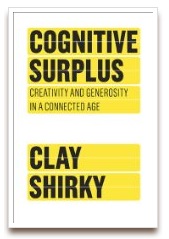 From Amazon: “For decades, technology encouraged people to squander their time and intellect as passive consumers. Today, tech has finally caught up with human potential. In Cognitive Surplus, Internet guru Clay Shirky forecasts the thrilling changes we will all enjoy as new digital technology puts our untapped resources of talent and goodwill to use at last.”
From Amazon: “For decades, technology encouraged people to squander their time and intellect as passive consumers. Today, tech has finally caught up with human potential. In Cognitive Surplus, Internet guru Clay Shirky forecasts the thrilling changes we will all enjoy as new digital technology puts our untapped resources of talent and goodwill to use at last.”
A few of my highlighted excerpts from Cognitive Surplus by Clay Shirky (more after the jump).
“The postwar trends of emptying rural populations, urban growth, and increased suburban density, accompanied by rising educational attainment across almost all demographic groups, have marked a huge increase in the number of people paid to think or talk, rather than to produce or transport objects.” – page 4
“Someone born in 1960 has watched something like fifty thousand hours of TV already, and many watch another thirty thousand hours before she dies.” – page 6
“…in the whole of the developed world, the three most common activities are now work, sleep, and watching TV.” – page 6
“Americans watch roughly two hundred billion hours of TV every year. … We spend roughly a hundred million hours every weekend just watching commercials.” – page 10
“As long as the assumed purpose of media is to allow ordinary people to consume professionally created material, the proliferation of amateur-created stuff will seem incomprehensible.” – page 19
“Imagine that everything says 99 percent the same, that people continue to consume 99 percent of the television they used to, but 1 percent of that time gets carved out for producing and sharing. The connected population still watches well over a trillion hours of TV a year; 1 percent of that time is mor than one hundred Wikipedias’ worth of participation per year.” – page 23
“In 2010 the global internet-connected population will cross two billion people, and mobile hone accounts already number over three billion. Since there are something like 4.5 billion adults worldwide (roughly 30 percent of the global population is under fifteen), we live, for the first time in history, in a world where being part of a globally interconnected group is the normal case for most citizens.” – page 23
